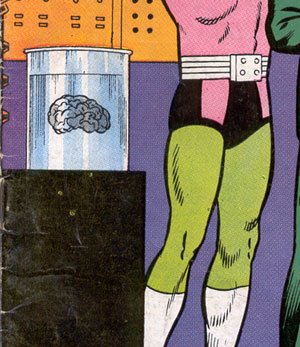by Scott McLemee on December 20, 2007
Santa came a little early this year. The single most exciting possibility in American politics remains, of course, the idea that Bob Avakian, Chairman of the Central Committee of the Revolutionary Communist Party, USA might emerge from the underground to campaign for the office of President of the United States. Alas, my appeal to him to do this has so far gone unanswered.

Instead, all we’ve had lately is a very long speech in which Chairman Bob talks about himself in the third person. What’s necessary is “a culture of appreciation, promotion, and popularization around the leadership, the body of work and the method and approach of Bob Avakian,” he says. Well, sure. But first you sort of need a reason to call a press conference. This is where the 24 hour news cycle is your friend. From a single spark….
In the meantime, Mike Ely, a former editor of the RCP newspaper, has come out with a cogent and thorough critique (pdf) of Avakian’s recent writings and the entire cult(ure) around him.
All irony to the side, I must say that this is a pretty interesting document, and so is the rest of Ely’s website. It is clearly the work of someone whose Maoism comes by way of Godard and Badiou as well as the RCP’s idiosyncratic Gang of Four-ism. For those who are interested in that kind of thing, it is the kind of thing they will find interesting. Thanks to Santa’s elves for bringing it to my attention.
by John Holbo on December 20, 2007

I’ve made you some free X-Mas cards and gift tags!
Printables!
Just like the ones your kids alway waste the good paper on! So there’s never any when you need it! But before I give you the download links, I have some explaining to do.
The world is filthy with X-Mas cards, says you. Well, I think mine are rather special and nice. They are based on visual elements extracted from Ernst Haeckel’s Kunstformen der Natur (1904). A very famous and beautiful work. Wikicommons has some lovely pictures. You know what I like best about that cover? (Thanks for asking, and feel free to click for larger.)
I like the fact that ‘Leipzig und Wien’ is in a sans serif font. Somehow that makes it perfect.
[click to continue…]
by John Holbo on November 24, 2007
Matthew Yglesias links to an interesting paper:
“I call on every red-blooded white man to use any means to keep the niggers away from the polls; if you don’t understand what that means you are just plain dumb.” These were the words of United States senator Theodore G. “The Man” Bilbo of Mississippi, as he addressed white supporters during his successful re-election campaign in June 1946. His inflammatory language ignited a firestorm, however, that prevented him from taking his Senate seat in January 1947 and ended the career of one of the nation’s most flamboyant politicians.
“The Man” fell because of the growing intolerance among many whites toward public racism and anti-Semitism. Throughout the 1920s and 1930s, white elites outside the South—defined here as leading daily newspapers, weekly magazines, organizations, and political leaders—largely ignored Bilbo’s racist incitements. World War II, however, brought about a significant change in elite attitudes. Due to the ideological war against Nazism, America’s emergence as a superpower, and the unifying nature of the conflict, the kind of virulent public racism that was a trademark of Bilbo’s career was no longer tolerated outside of the South. Bilbo’s career, from his return to the governor’s mansion in 1928 through the Senate debate over his seating in 1947, parallels and illustrates the declining tolerance of overt racism and nativism in the United States.
Yglesias files this under ‘the past is another country.” That’s only the half of it. [click to continue…]
by Henry Farrell on November 5, 2007
Ezra Klein, responding to this blog and others, lists off the five bloggers whom he misses most. Prominent among them, of course, being the Fafblog, “the only blog that’s ever really mattered.” See also Dan Nexon on how “the fact of the matter is… and now I’m going to get choked up and grieve for a minute about the gaping hole its lack of updates has left in the blogmarch… almost any random selection from Fafblog would beat out the competition.” Which is so completely and obviously true. But even as the Library of Congress is cataloguing and preserving blogs of “historical importance to the Congress and to the American people,” the Fafblog’s archives, a genuine national treasure if ever there was one, are 404ing (I’m sure that both Brewster Kahle and Google have them stashed away somewhere but what a pain). In order to collate and preserve material of vital historical significance, I ask you, Crooked Timber readers, to link to, quote _in extenso_, and thus preserve your favourite Fafblog posts of all time. As my contribution – this reminder of how, long before there were glibertarians, there were Gibletarians.
[click to continue…]
by Henry Farrell on October 9, 2007
I’m sure this is fundamentally immature of me, but the new Republican National Convention logo set off a train of associations in my head (and prompted me to spend half an hour doing some basic Photoshop work to bring these associations to the foreground). More artistically talented readers than myself are invited to submit their own interpretations (Michael Froomkin has a copy of the original image at this post).

by John Holbo on September 14, 2007
By general acclaim, it’s a fairly Golden age for TV. Thanks to HBO, but also for other reasons. Mostly it has to do with improved story-telling, due to whole season or multi-season story arcs, made possible largely by the DVD market, I suppose. Shows are being made to be sold as season-length packages. The effect on quality is salutary, but there are two risks. First, the show runs too long. A good story is undone – the early promise retroactively debased – by writers forced to drag it out; keep the golden goose laying past her prime. Second, a good show may be canceled, leaving the audience unable to finish the damn story.
Example: Invasion (2005) – which I’m considering buying for the typical Holbonic reason that it’s marked down 60%. (As a purchaser, I am indifferent – swayed neither in favor or against – by the consideration that it is written/produced by former teen idol Shaun Cassidy.) Who here has watched it? Any good? It seems to have won a solid fan-base, but not enough to stave off cancellation – supposedly due to a slow start, and being about a hurricane at the time of Katrina.
(2005) – which I’m considering buying for the typical Holbonic reason that it’s marked down 60%. (As a purchaser, I am indifferent – swayed neither in favor or against – by the consideration that it is written/produced by former teen idol Shaun Cassidy.) Who here has watched it? Any good? It seems to have won a solid fan-base, but not enough to stave off cancellation – supposedly due to a slow start, and being about a hurricane at the time of Katrina.
I like a good SF yarn. I don’t really like the thought of a cliffhanger with no resolution. But these sorts of no-end productions are actually becoming more common – the Edwin Droodification of TV, if you will. Which reminds me. I happened to catch a bit of a memorable Doctor Who episode a year ago – which I now learn is “The Unquiet Dead”. Charles Dickens is in it, and – inspired by the creepy, gaseous Gelth he has met – he promises to finish Drood, making the murderer a ‘blue elemental’. Maybe it could turn out, conversely, that there is a somewhat hypocritical family of Victorian snobs from Cloisterham under the water (!). Or something.
Let us discuss the state of TV, the long story arc, the advantages and risks that accrue thereto.
by John Holbo on September 13, 2007
It turns out that short Nature Neuroscience paper discussed before, “Neurocognitive correlates of liberalism and conservatism”, is available free (PDF). In case you were curious.
by John Holbo on September 11, 2007
by John Holbo on September 5, 2007
Mark Levin:
There is indeed a culture of corruption, and it extends well beyond any single politician. It swirls around big government. It always has and it always will. It has become institutionalized in many ways. And that culture of corruption celebrates clever word games used by unelected judges to exercise power they don’t have as they rewrite the Constitution; it demeans people of faith who speak out against the culture of corruption and for — dare I say — family values; it undermines and seeks to demoralize Americans in uniform as they fight a horrible enemy on the battlefield; it demonizes entrepreneurs and successful enterprises; it uses race, age, religion, gender, and whatever works to balkanize Americans; and so on. This is the real culture of corruption. Let’s call it what it is — modern liberalism. And its impact on our society is far worse than the disorderly-conduct misdemeanor to which Larry Craig pled guilty and for which he has now resigned.
by John Holbo on July 10, 2007
Redstate, focusing on the issues of the day:
Franklin Delano Roosevelt chose the price of gold using the same methods with which you or I would choose PowerBall ticket numbers. If that doesn’t frighten and outrage you, I don’t know what will.
The author also reports that the George F. Will column in question, “made me spring out of my chair and pace around in abject disbelief and not a little anger.”
Thank goodness there’s no policy flippancy in the White House these days, otherwise urgent, perambulatory scowling at the olds, as we might call them, might look like aversion of one’s gaze from the news.
I wouldn’t make fun, except he put in that bit about springing and pacing.
UPDATE: And the author responds – to Kevin Drum, not to me. If you hate FDRblogging so much, “why don’t you write a post telling Democrats to stop raising the specter of Herbert Hoover at the drop of a hat?”
by John Holbo on July 10, 2007
Just wanted to take note of a felicitous typo from Andrew Sullivan:
But it could give the neocons a new leash on life, a way to invigorate their exhausted ideological engines.
Quite unrelatedly, I was amused to read:
It is debatable whether paganism is a religion, per say.
I’m not sure whether he misspelled ‘per se’ or was, rather, reaching for ‘so to speak’, as one might grope for the bottle.
The piece reminded me of Kieran’s post about how ‘atheism’ was, originally, a charge lodged against Christians. It’s interesting to find predicates that have wandered so comprehensively.
by Kieran Healy on April 20, 2007
From the Economist, some advice on English As She Is Wrote. As is usual with such lists, there’s much to agree with and a few nits to pick. A current peeve of mine — which doesn’t make the list — is the use of “incredibly” to mean “very.” There is also probably a name for the law requiring that there be several errors of style or grammar in this paragraph, but I don’t know what it is.
by John Holbo on April 15, 2007
Obviously the reason why old comics provoke a certain sort of joke is the underwear on the outside, plus dialogue that, apparently, dare not speak the name of whatever the hell it is the characters are trying to discuss. But sometimes this can really be taken to extremes:

What are we supposed to think? Johnny Thunder is a gay robot? But this isn’t really what I wanted to talk about tonight.
[click to continue…]
by John Holbo on April 14, 2007
If you, like me, are a professional philosopher, sometimes it seems like you have to talk about the whole Descartes thing … well, sometimes it seems like you couldn’t swing a dead cat without hitting yourself giving a lecture about how maybe there’s an Deceiving Demon messing with you to a considerable extent.
Now: probably you don’t have good art skills, so you just draw a circle on the board and announce to the students, with confidence that brooks no demurral, ‘this is YOU’. (Or, rather, your MIND.)
Students [collective Troy McClure imitation]: It’s like he’s known me all my life!
You [blushing modestly]: Well, I do have a Ph.D.
But suppose your students still insist that they don’t get it about the whole Deceiving Demon thing. Well, with this one-size fits-all graphic, you can explain 53% of all known epistemological problems. I give you: Superman’s Pal Jimmy Olsen’s Brain In A Jar!

hat tip: ISB
Those are some clear and distinct shorts he’s wearing, if I do say so myself.
TOMORROW: Hawkman explains the Treaty of Versailles.
by John Holbo on April 11, 2007
Jonah Goldberg is now grumbling that people are calling him stupid. But, to be fair, the upshot of Goldberg’s indignant response to Henry’s post would seem to be that Henry was actually too charitable to Goldberg’s original post. But I’m getting ahead of my story. Goldberg complains: “Any fair reader of my post (hint, that excludes Henry) would see that I was criticizing liberals and conservatives for not taking culture into account enough.” Now what would that too low accounting value be? “My point was not that culture is everything, but that government isn’t everything.” That is, Goldberg is claiming that the assignment of a non-zero significance to culture is bold contrarianism that places him at odds with both left and right. Of course, far from being a bold position, the claim that culture is not nothing is something everyone would grant freely, if it seemed to anyone worth mentioning.
To put it another way, Goldberg is making a standard rhetorical move which has no accepted name, but which really needs one. I call it ‘the two-step of terrific triviality’. Say something that is ambiguous between something so strong it is absurd and so weak that it would be absurd even to mention it. When attacked, hop from foot to foot as necessary, keeping a serious expression on your face. With luck, you will be able to generate the mistaken impression that you haven’t been knocked flat, by rights. As a result, the thing that you said which was absurdly strong will appear to have some obscure grain of truth in it. Even though you have provided no reason to think so.




